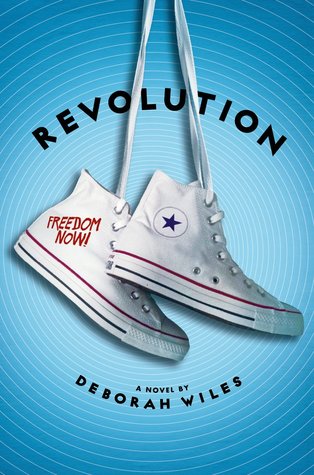Revolution (The Sixties Trilogy: Book Two) - Deborah Wiles
A National Book Award Finalist review:
"There is no state with a record that approaches that of Mississippi in inhumanity, murder, brutality, and racial hatred. It is absolutely at the bottom of the list."
Roy Wilkins, Chairman of the NAACP
(National Association for the Advancement of Colored People)
Deborah Wiles' second book in The Sixties Trilogy focuses on the Freedom Summer of 1964 in Greenwood, Mississippi—the summer when volunteers came down and "invaded" the state in order to help back individuals register to vote and better understand their rights as citizens. At the centre of the story are Sunny Fairchild (a white girl who tells of how the town goes haywire in the wake of change), and Raymond Bullis (a black teen who just might become someone others won't be able to ignore.) Other secondary characters round out the novel to great effect, bringing to light a range of opinions, prejudices, and desires.
There was a colored boy in our pool. A colored boy. And I touched him, my skin on his skin. I touched a colored boy. And then he ran away, like he was on fire.Sunny and Raymond are both strong characters, highly believable and suited to the book's rich setting. What the length of the text allows Wiles to do is create nuanced and complex characters on all levels, from primary, to secondary, to background. Sunny and Raymond were raised never questioning segregation, which for a contemporary audience seems, in some ways, incredible and even unbelievable. But as Sunny and Raymond experience more and more throughout Freedom Summer, they each begin to question what they have been taught and what they always assumed to be concrete and unchanging.
Each character's reaction to the civil rights workers is believable, giving the community at large a very authentic feel (as much as I can assert any idea of authenticity since I was not around during that time or in that place.) The atmosphere within the novel screams of stifling heat and hot tempers, with minimal relief from an air conditioning unit or fan blast. Places are described in wonderful detail, making it feel as though one is actually there:
I love the Leflore County Courthouse. It's the grandest building in Greenwood, all that white, sturdy stone, all that carving, all that heaviness, so serious, and at the same time so sheltering, with those four massive columns in front of the doors that just beckon you on in, like the columns across the front of the White House.... The courthouse columns seem to say, Come in, we're open for business, we've been waiting for you, it's safe inside. And it is. Cool, too. Today is another scorcher.
Revolution is a great mix of action, characterization, and historical accuracy, rounded out with moments of characters pondering their own reactions to events occurring in the community. While it is obvious the book is meant to be a tool that will inspire and teach, the didacticism is rarely overwhelming or preachy, especially since so much of the supporting non-fiction material keeps Wiles' narrative separate, and therefore more subtle.
The novel is long, granted, but it is a text that wonderfully captures the environment and setting of the summer of 1964, interspersed with photos, newspaper clippings, and speeches that bring the whole event to life. There is also a solid bibliography and back matter that examines the non-fiction components of the story in greater depth. Wiles covers a LOT of ground, exploring many themes and the roles of a whole bunch of groups and individuals: the KKK, the Citizens' Council, the FBI, the SNCC, and many more. What many residents of Greenwood, Mississippi initially saw as an invasion eventually turned into an incredibly influential movement.
Wiles' writing style is solid and atmospheric, bringing the Freedom Summer to life in this moving and brilliantly composed text. Is this a National Book Award winner? It's entirely possible!
Highly Recommended


Comments
Post a Comment